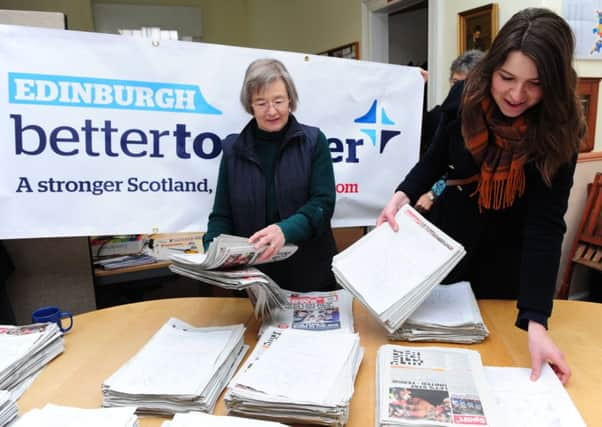Leaders: No campaign suffers from negative effects


It does not look assured now. Despite the backing of three major political parties, much of the business community and the resilience of a union that has withstood wars, recessions and immense social changes for 300 years, support for a No vote has been losing ground and the Yes campaign, helped by shrewd and skilful communications, is pouncing on every setback. And setbacks there have been.
There is, as yet, no coherent response to the question: “What is on offer for Scotland by way of further devolution if there is a narrow vote for No on 18 September?” Labour has offered a small increase in tax-varying powers – principally the power to raise the higher rates of tax upwards. The Liberal Democrats seek a UK-wide federal solution. The Scottish Conservatives have yet to spell out what they propose. It is hard to imagine, after a battle that has seen an unprecedented mobilisation of support for independence, that voters would simply sit back quietly and settle for status quo ante, or a more strident version of the Labour policies that Scottish voters have now twice roundly rejected. Yet the divisions between the unionist parties look as wide as ever.
Advertisement
Hide AdAdvertisement
Hide AdSearching questions have also been raised, both about the tenor of the No campaign, widely perceived as negative, and about the inspiration and dynamism of its leadership. It has relied heavily on a fusillade of facts – but in a campaign such as this, almost every fact is contested and there is instead a war of interpretation.
Now, just when a firm grip was needed, comes a report that would seem to cast doubt on a cardinal statement barely a month ago that, in the event of a Yes vote, Westminster would not enter into negotiations over currency sharing. The report, credited to a senior UK government minister, has been vigorously denied. But it has done considerable damage to the credibility of the unionist position and created sufficient doubt as to lend support to Alex Salmond’s assertion from the beginning that it was “bluff, bluster and bullying”.
The Better Together campaign has now come to a critical moment that may prove pivotal to the referendum outcome. It has still to articulate a message and radiate a vision at least as positive as that of the Yes campaign. It has to convey that vision with enthusiasm, energy and panache.
The battle is by no means lost to it: opinion polls still show a majority in favour of remaining within the Union and there are many questions still to be convincingly answered.
These are matters that require a serious, reasoned and vigorous pursuit. For, as the Scottish Secretary Alastair Carmichael has himself made clear, a vote to remain in the UK can by no means be taken for granted by Better Together.
Baton carriers to be congratulated
EXTRAORDINARY. Inspiring. And above all, courageous: thousands of remarkable Scots will do their country proud in carrying the Queen’s Baton in the relay ahead of the Commonwealth Games. Around 4,000 individuals will learn today that they have been chosen to spirit the baton throughout Scotland on the final 40 days of its global tour of the nations and territories of the Commonwealth. The Olympic torch tour two years ago was a stunning success and generated enormous interest and coverage, with crowds lining the route through towns and villages. It fired the imagination and brought great excitement to communities across the land. The Baton relay for the Glasgow Commonwealth Games will have a similar – if anything more intense – effect in Scotland.
Many participants have been inspirations themselves in quiet and often unnoticed ways. They include a teenager with cerebral palsy who has secured medals across a range of sports, to a wheelchair rugby player who inspired others to take up the game. Little wonder the Glasgow 2014 organisers say they have been “overwhelmed and humbled” by the calibre of the individuals nominated.
The relay, which left Buckingham Palace in October last year and made a brief stop in Glasgow en route to India, will arrive in Edinburgh on 14 June before travelling throughout the country. With around 100 people carrying the baton every day, it will arrive in Glasgow just before the Games begin on 23 July, concluding an epic 190,000 kilometre journey.
Congratulations to the thousands of Scots who will be carrying the Baton. It is absolutely fitting that their efforts are being recognised in this way.